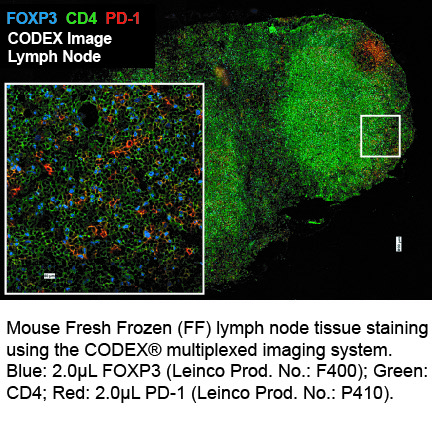Anti-Mouse FOXP3-BX024; Alexa Fluor™ 647-RX024
Product Code:
LEI-F400
LEI-F400
Host Type:
Rat
Rat
Antibody Isotype:
IgG2b κ
IgG2b κ
Antibody Clonality:
Monoclonal
Monoclonal
Antibody Clone:
MF-14
MF-14
Regulatory Status:
RUO
RUO
Target Species:
Mouse
Mouse
Applications:
- Flow Cytometry
- Immunofluorescence (IF)
- Immunohistochemistry (IHC)
- Spatial Biology
- Western Blot (WB)
Storage:
This Phen°Cycler-Fusion (CODEX)® barcoded antibody is stable when stored at 2-8°C for up to 1 year (do not freeze). The CODEX® reporter is stable when frozen at -20°C for up to 1 year.
This Phen°Cycler-Fusion (CODEX)® barcoded antibody is stable when stored at 2-8°C for up to 1 year (do not freeze). The CODEX® reporter is stable when frozen at -20°C for up to 1 year.
No additional charges, what you see is what you pay! *
| Code | Size | Price |
|---|
| LEI-F400-25Tests | 25 tests | £532.00 |
Quantity:
Prices exclude any Taxes / VAT



